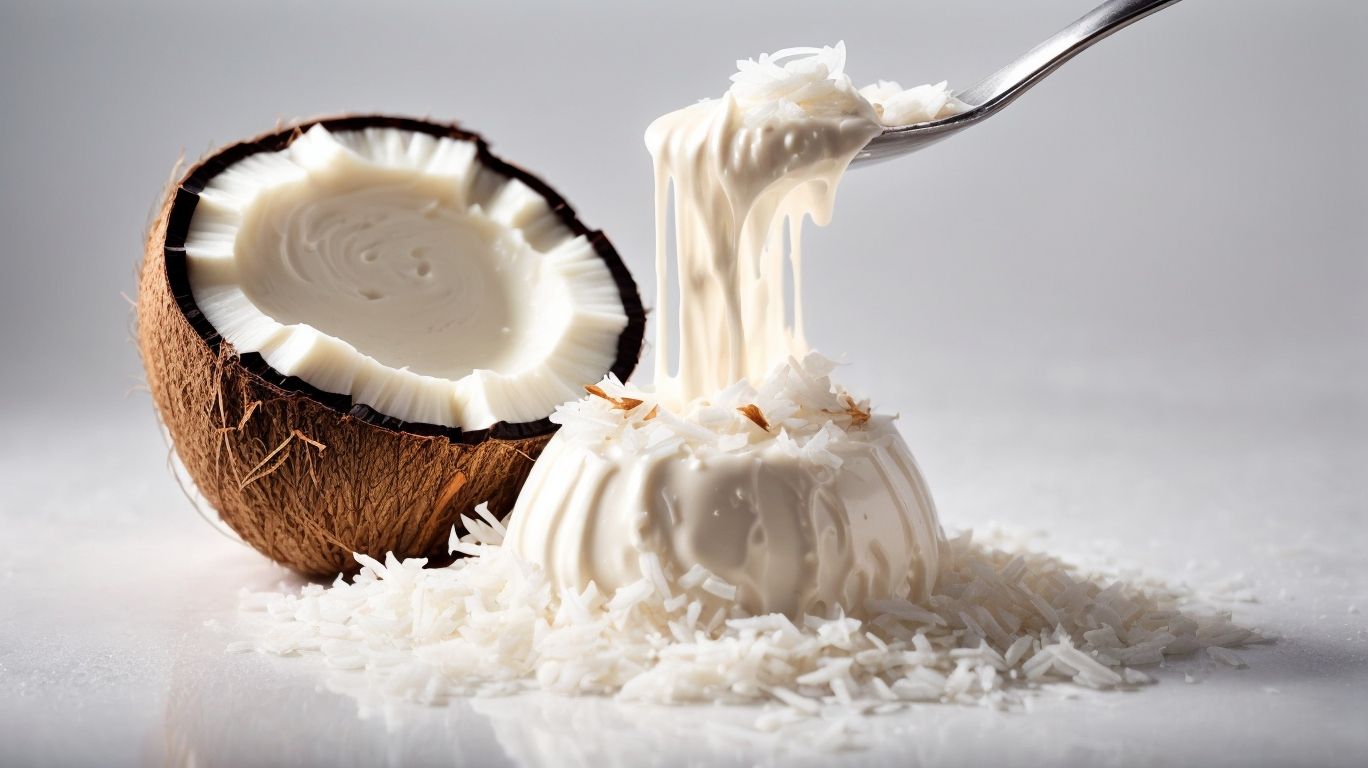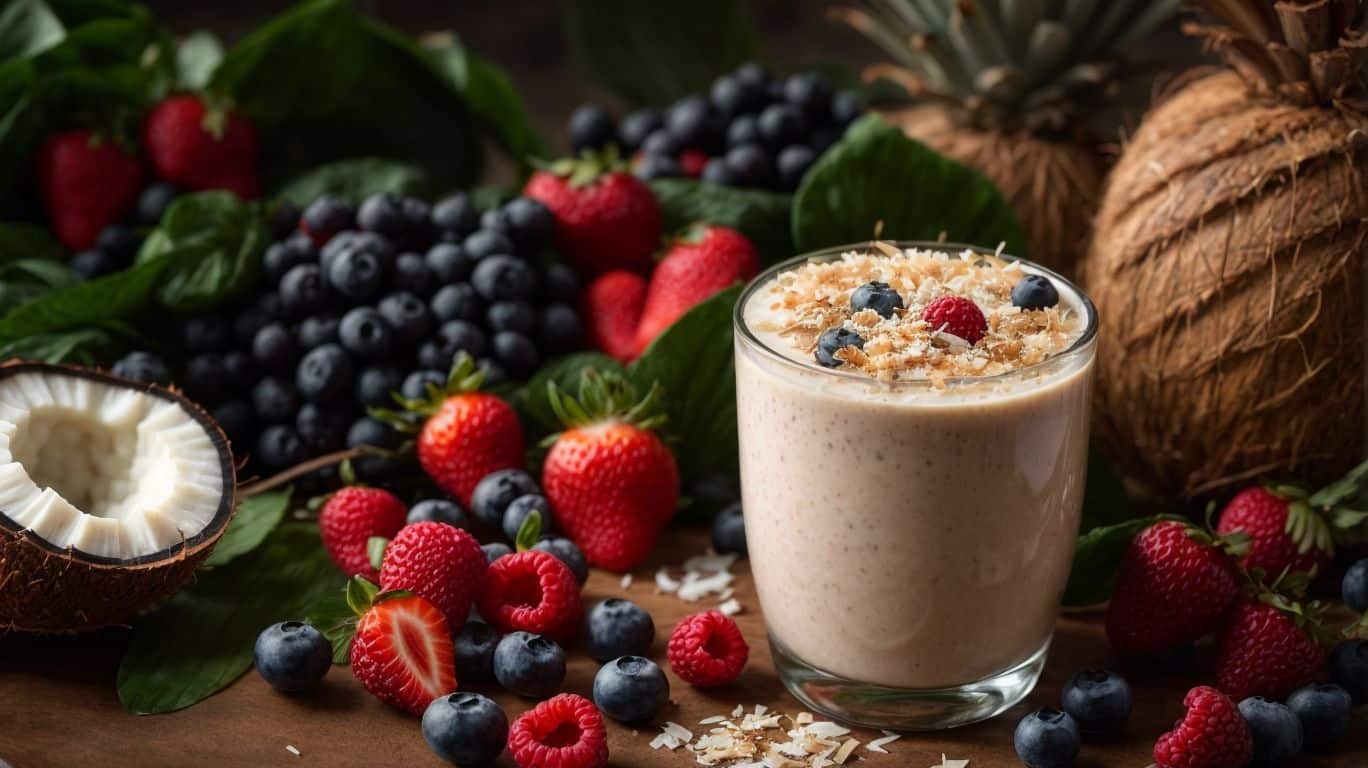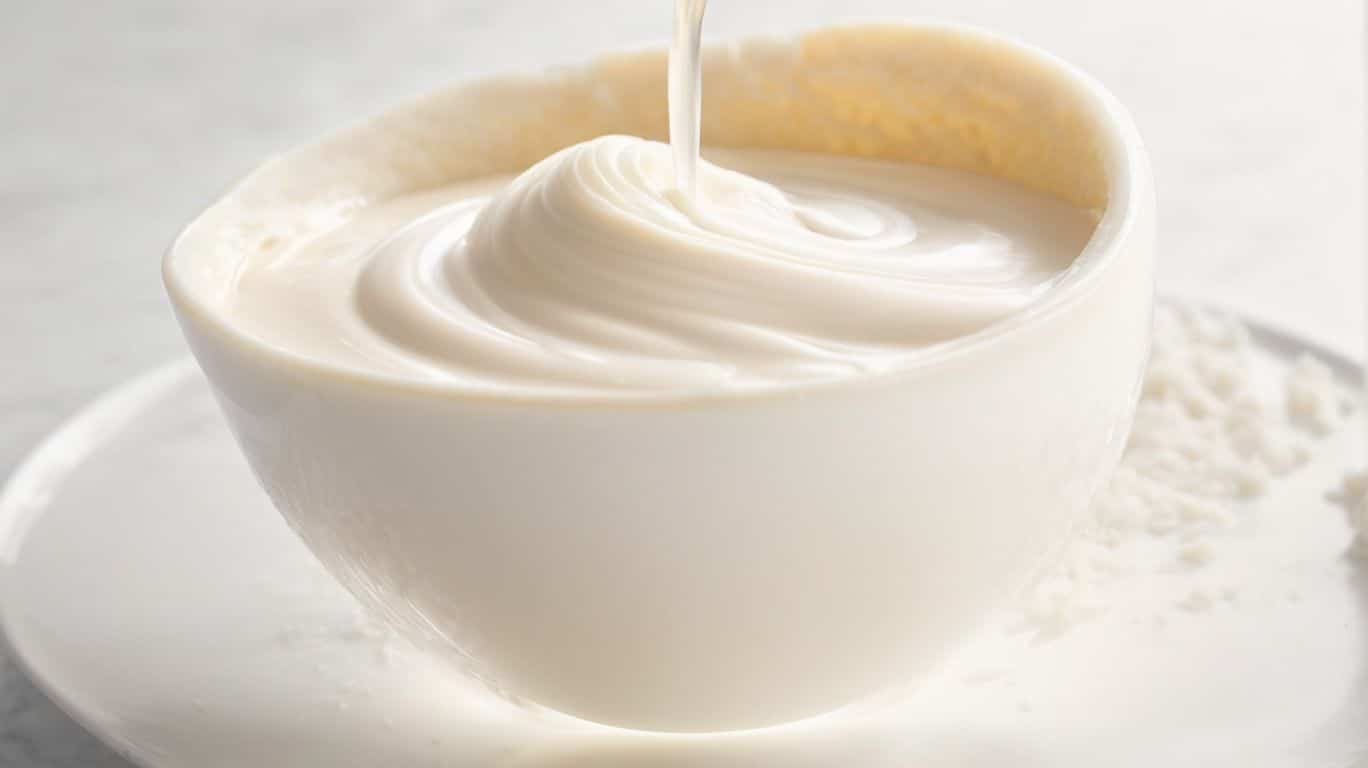“
Coconut milk has gained popularity in recent years as a dairy alternative, especially among those following the ketogenic diet. The ketogenic diet, or keto diet, is a low-carb, high-fat diet that aims to induce a state of ketosis in the body. It involves consuming foods that are low in carbs and high in fats, and coconut milk seems to fit the bill. But is coconut milk truly keto-friendly? Let’s find out.
To understand whether coconut milk can be consumed on the keto diet, it’s essential to analyze its macronutrient content. Coconut milk is rich in fats, specifically medium-chain triglycerides (MCTs), which are a preferred energy source for those in ketosis. However, it also contains a moderate amount of carbohydrates, mainly in the form of fiber.
When following the keto diet, it’s crucial to maintain a specific macro ratio, with the majority of calories coming from fats, a moderate amount from protein, and minimal carbs. Coconut milk can be a part of this ratio if consumed in controlled portions.
While coconut milk can be included in the keto diet, there are also other dairy alternatives available. These alternatives offer benefits such as lactose-free options for those with dairy intolerances or allergies. It’s important to compare and understand the nutritional profiles of different dairy alternatives to make informed choices.
In addition to discussing the nutritional aspects, this article will also highlight popular coconut milk recipes suitable for the keto diet. It will explore considerations when using coconut milk on the keto diet, such as portion sizes and reading labels for added sugars.
By exploring the role of coconut milk and other dairy alternatives in the context of the keto diet, individuals can make informed decisions about their dietary choices while maintaining ketosis and enjoying a varied and flavorful diet.
“
What is the Keto Diet?

Photo Credits: Ieatketo.Com by Charles Carter
The keto diet, short for ketogenic diet, is a low-carb, high-fat eating plan. What is the Keto Diet? It focuses on reducing carbohydrate intake and increasing healthy fats to promote ketosis, a metabolic state in which the body burns fat for fuel instead of glucose. This can lead to weight loss and improved blood sugar control. The diet typically includes foods like meat, fish, eggs, avocados, nuts, and seeds while limiting starchy foods, grains, sugars, and most fruits. It’s important to consult with a healthcare professional before starting any diet.
Fact: The exact macronutrient ratios in a keto diet may vary, but typically consist of 70-75% fat, 20-25% protein, and 5-10% carbohydrates.
Understanding the Macronutrient Content of Coconut Milk

Photo Credits: Ieatketo.Com by Austin Sanchez
Understanding the Macronutrient Content of Coconut Milk
Coconut milk is a popular dairy alternative for those following a keto diet due to its low carbohydrate content. Understanding the macronutrient content of coconut milk can help you make informed food choices. Here is a breakdown of the macronutrient content of 100ml of canned coconut milk:
| Calories | 230 |
| Carbohydrates | 2g |
| Fat | 24g |
| Protein | 2g |
Pro-Tip: When using coconut milk on a keto diet, opt for full-fat, unsweetened varieties to keep your carbohydrate intake low.
How Does Coconut Milk Fit into the Ketogenic Macro Ratio?
Coconut milk can be a suitable addition to the ketogenic diet due to its high fat content and low carbohydrate content. When considering how coconut milk fits into the ketogenic macro ratio, it is important to note that coconut milk is primarily composed of fats, making it beneficial for those following a high-fat, low-carb eating plan. While coconut milk does contain some carbohydrates, these are considered to be minimal and can easily fit into the keto macro ratio. It’s important to be mindful of portion sizes and read labels for added sugars, as these can impact ketosis. By incorporating coconut milk into keto-friendly recipes like smoothies or curries, it can be enjoyed as a part of a balanced ketogenic diet.
Dairy Alternatives for the Keto Diet
- When following the keto diet, it may be necessary to find dairy alternatives that are low in carbs and fit within the macronutrient ratios. Here are some options to consider:
- Almond milk: This popular dairy alternative is low in carbs and can be easily incorporated into a keto diet.
- Coconut milk: Although higher in fat, coconut milk is also low in carbs and can add a creamy texture to dishes.
- Cashew milk: With a slightly higher carb content, cashew milk should be consumed in moderation on the keto diet.
- Hemp milk: Made from hemp seeds, this dairy alternative is low in carbs and packed with omega-3 fatty acids.
- Oat milk: While it’s a bit higher in carbs, some brands offer low-carb versions of oat milk that can be enjoyed in moderation.
By incorporating these dairy alternatives into your keto diet, you can still enjoy a variety of flavors and textures while sticking to your macronutrient goals.
Benefits of Dairy Alternatives
Benefits of Dairy Alternatives
Incorporating dairy alternatives into a keto diet offers a multitude of benefits. Individuals following a keto diet can enjoy creamy beverages without discomfort, thanks to lactose-free options like coconut milk. Moreover, dairy alternatives like coconut milk have lower carbohydrate content compared to regular milk, making them a preferable choice for maintaining ketosis.
Furthermore, coconut milk, a popular dairy alternative, is packed with healthy fats known as medium-chain triglycerides (MCTs). These MCTs can be easily converted into energy and support the production of ketones. In addition to being a rich source of healthy fats, dairy alternatives often contain essential vitamins and minerals like calcium, vitamin D, and vitamin B12, ensuring individuals meet their nutritional needs.
The versatility of dairy alternatives is another advantage. Coconut milk, for example, can be used in a variety of recipes such as smoothies, curries, and baked goods, enhancing flavor and providing creaminess to keto-friendly meals.
Incorporating dairy alternatives into a keto diet not only offers a delicious alternative to traditional dairy products but also provides unique nutritional benefits. To find the dairy-free options that best suit your taste preferences and health goals, don’t hesitate to experiment with different alternatives.
Nutritional Comparison of Dairy Alternatives
Nutritional Comparison of Dairy Alternatives
When considering dairy alternatives on the keto diet, it’s essential to compare the nutritional values of different options. Here, we provide a detailed analysis of the popular dairy alternatives:
| Calories | Fat (g) | Protein (g) | Carbs (g) | |
|---|---|---|---|---|
| Coconut milk | 115 | 12 | 1 | 2 |
| Almond milk | 30 | 2.5 | 1 | 1 |
| Soy milk | 80 | 4 | 7 | 4 |
| Cashew milk | 25 | 2 | 0.5 | 2 |
As per the above table, when comparing the nutritional values, coconut milk stands out with the highest calorie and fat content among the dairy alternatives. On the other hand, almond milk is low in calories and fat while still providing a fair amount of protein. Soy milk, however, is rich in protein. Cashew milk, being the lowest in calories, has a slightly higher carb content. These nutritional differences should be carefully considered when choosing a dairy alternative for the keto diet.
Popular Dairy Alternatives for the Keto Diet
For those following the keto diet, there are several popular dairy alternatives for the keto diet that can be incorporated into their meals. These alternatives provide a variety of flavors and can be used in a range of dishes. Some popular dairy alternatives for the keto diet include:
| Almond Milk: | A low-carb option that is high in healthy fats and provides a creamy texture. |
| Coconut Milk: | Rich and creamy, coconut milk is an excellent choice for adding flavor to curries, smoothies, and baked goods. |
| Cashew Milk: | Creamy and slightly sweet, cashew milk is a versatile option that can be used in both sweet and savory recipes. |
| Hemp Milk: | Made from the seeds of the hemp plant, hemp milk is a nutritious option that provides a good balance of fats, protein, and carbohydrates. |
Pro-tip: When selecting a dairy alternative, be sure to choose unsweetened options to avoid added sugars and extra carbs.
Coconut Milk Recipes for the Keto Diet

Photo Credits: Ieatketo.Com by Philip Sanchez
Looking for delicious and keto-friendly recipes? Look no further! In this section, we will dive into the world of coconut milk and its incredible culinary possibilities for those following the keto diet. From refreshing smoothies to flavorful curries, we will explore two sub-sections that will surely satisfy your taste buds: the keto-friendly coconut milk smoothie and the tantalizing keto curry with coconut milk. Get ready to discover how coconut milk can add both taste and nutrition to your keto journey!
Keto-friendly Coconut Milk Smoothie
A keto-friendly Coconut Milk Smoothie is a nutritious and delicious choice for individuals on a ketogenic diet. It can be easily prepared using simple ingredients. Here is a breakdown of the nutritional content of a typical Keto-friendly Coconut Milk Smoothie:
| Nutrient | Amount per Serving |
|---|---|
| Calories | 150 |
| Fat | 10g |
| Protein | 5g |
| Carbs | 10g |
| Fiber | 3g |
| Sugars | 5g |
| Net Carbs | 7g |
To create this smoothie, blend together 1 cup of unsweetened Coconut Milk, 1/2 cup of frozen berries, 1 tablespoon of almond butter, 1 tablespoon of chia seeds, and a handful of spinach. If desired, you can add a low-carb sweetener. This Keto-friendly smoothie provides a delightful way to incorporate coconut milk into your ketogenic diet.
Keto Curry with Coconut Milk
To create a delectable keto curry with coconut milk, gather the essential ingredients and spices. Here is a breakdown of the elements needed to make a keto-friendly coconut milk curry:
| Ingredients | Amount |
| Coconut milk | 1 cup |
| Chicken or vegetables | 1 pound |
| Curry paste or powder | 2 tablespoons |
| Garlic | 2 cloves, minced |
| Ginger | 1-inch piece, grated |
| Onion | 1, diced |
| Vegetables (optional) | 1 cup, chopped |
| Coconut oil | 1 tablespoon |
| Salt and pepper | To taste |
| Fresh cilantro (for garnish) |
In a pan, heat coconut oil and sauté the onion, garlic, ginger, and vegetables (if using). Incorporate the curry paste or powder and cook for a minute. Introduce the chicken or vegetables and cook until fully cooked. Pour in the coconut milk and let it simmer for 10 minutes. Season with salt and pepper. Serve the keto curry with cauliflower rice or low-carb noodles. Adorn with fresh cilantro.
Indulge in your homemade keto curry, enriched with the luscious and velvety flavor of coconut milk! Remember to use high-quality ingredients and adjust the level of spiciness to suit your taste. Feel free to experiment with various vegetables and protein options to personalize your curry.
Considerations When Using Coconut Milk on the Keto Diet

Photo Credits: Ieatketo.Com by Douglas Nguyen
When incorporating coconut milk into your keto diet, there are several considerations you should keep in mind. These considerations include:
- Net carbs: It is important to check the label of the coconut milk for its net carb content. Some brands may add sugars or thickeners that can increase the carb count.
- Fat content: Opt for full-fat coconut milk as it contains a higher percentage of healthy fats, which are essential for the keto diet.
- Portion size: Since coconut milk is calorie-dense, it is crucial to be mindful of portion sizes to avoid consuming excessive calories.
- Other dairy alternatives: To vary your nutrient intake, you may also consider incorporating other dairy alternatives such as almond or cashew milk.
Coconut milk has a long history in Southeast Asian cuisine, where it is extracted from mature coconuts’ grated flesh. Its rich flavor and creamy texture make it a versatile ingredient in sweet and savory dishes. Traditional medicine practices have recognized the health benefits of coconut milk, particularly its high lauric acid content. Nowadays, it remains a popular choice for those following the keto diet due to its low carb and high fat content.
Limiting Portion Sizes
When consuming coconut milk on the keto diet, it’s crucial to limit portion sizes to stay within your daily macronutrient goals.
- Measure servings: Use measuring cups or a food scale to accurately portion out how much coconut milk you’re consuming.
- Be mindful of fat content: Coconut milk is high in fat, so be conscious of the amount you’re consuming to avoid exceeding your fat intake goals.
- Monitor carbohydrate intake: While coconut milk is relatively low in carbs, it’s still important to keep track of your overall carb intake and adjust your portion sizes accordingly.
- Consult a dietitian: If you’re unsure about portion sizes, a dietitian can assist you in determining the right amount of coconut milk for your individual needs and goals.
Reading Labels for Added Sugars
When following the keto diet, it is essential to carefully read labels to check for added sugars when selecting coconut milk. This is particularly important because many commercially available coconut milk brands contain added sugars, which can impede ketosis. To ensure that you remain within your carbohydrate limits, it is crucial to choose coconut milk that does not have any added sugars. By doing so, you can effectively maintain the desired state of ketosis and avoid any unexpected spikes in blood sugar levels. Thoroughly reading labels and understanding the ingredients list is pivotal in making informed choices and staying on track with your keto goals.
Let me share a true story: There was a time when I bought a popular brand of coconut milk for my keto smoothies without carefully reading the label. It turned out that this coconut milk had added sugars, causing me to unintentionally surpass my daily carbohydrate limits. I learned an important lesson from this experience – it is always necessary to read labels for added sugars when selecting coconut milk on the keto diet to prevent any setbacks.
Can Coconut Milk be Consumed on the Keto Diet?
Yes, coconut milk can indeed be consumed on the keto diet. However, it should be consumed in moderation due to its high fat content. Despite being low in carbohydrates, coconut milk is abundant in saturated fats. Therefore, it is crucial to control portion sizes to prevent excessive intake of calories. To ensure ketosis is not disrupted, it is essential to carefully examine labels for any added sugars when opting for coconut milk. It is strongly advised to choose unsweetened varieties of coconut milk. Ultimately, when incorporating coconut milk into the keto diet, it is vital to be mindful and consider its role within an overall balanced and healthy eating plan.
Facts:
Some Facts About “Is Coconut Milk Keto? Exploring Dairy Alternatives”:
- ✅ Coconut milk is a popular dairy-free alternative to cow’s milk for those following the ketogenic (keto) diet. (Source: healthline.com)
- ✅ Coconut milk is high in fat and low in carbs, making it suitable for a keto diet. (Source: healthline.com)
- ✅ Sweetened versions of coconut milk may contain too many carbs, so it’s important to choose unsweetened options. (Source: healthline.com)
- ✅ Coconut milk can be used in various keto-friendly recipes, such as soups, stews, curries, smoothies, and sauces. (Source: healthline.com)
- ✅ Almond milk is another popular milk alternative for the keto diet, as it is low in carbs and can be used in various recipes. (Source: masalamonk.com)
Frequently Asked Questions
Is coconut milk keto-friendly?
Yes, coconut milk is keto-friendly. It is high in fat and low in carbs, making it suitable for a keto diet. However, it is important to choose unsweetened versions of coconut milk and check the nutrition label to ensure it aligns with your macronutrient breakdown.
What are some other keto-friendly milk substitutes?
There are several milk substitutes that are suitable for a keto diet. Some options include almond milk, cashew milk, and flax milk. These alternatives are low in carbs and can be used in a variety of keto-friendly recipes.
Can I drink whole milk on a keto diet?
No, whole milk is not recommended for a strict keto diet. It contains a significant amount of carbohydrates, exceeding the daily carb limit for most keto dieters. It is better to opt for high-fat dairy products or unsweetened plant-based milks.
What is the nutritional breakdown of coconut milk?
Coconut milk is high in fat and low in carbs. The exact nutritional breakdown may vary depending on the brand, but on average, one cup of canned unsweetened coconut milk contains around 48 grams of fat and only 6 grams of carbs.
Are there any high-fat dairy products that are keto-friendly?
Yes, there are high-fat dairy products that can be included in a keto diet. Some options include heavy cream and half & half. These dairy products are low in carbs and can provide the necessary fat content for a successful keto diet.
Can coconut milk be used in keto recipes?
Absolutely! Coconut milk is a versatile ingredient that can be used in various keto-friendly recipes. It can be used in soups, stews, curries, smoothies, sauces, and even as a dairy-free coffee creamer. Just make sure to choose regular, unsweetened coconut milk for the best results.


